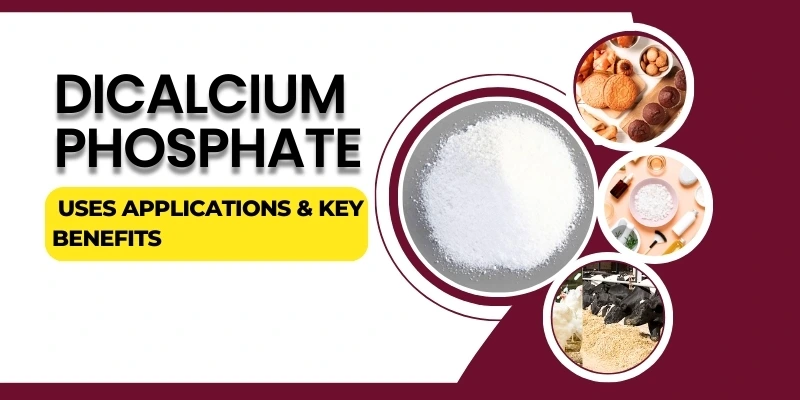
Dicalcium Phosphate: Uses, Applications & Key Benefits
Dicalcium phosphate (DCP) is a versatile chemical compound widely used in various industries, including food, pharmaceuticals, agriculture, and animal feed. Known for its excellent nutritional and functional properties, it plays a crucial role in multiple applications. In this blog, we will explore the benefits, Dicalcium Phosphate uses, and Dicalcium Phosphate applications across different sectors.
What is Dicalcium Phosphate?
Dicalcium phosphate (CaHPO₄), also known as dibasic calcium phosphate, is a calcium phosphate compound derived from phosphoric acid. It is commonly found in both anhydrous (water-free) and dihydrate (containing two water molecules) forms. This compound is valued for its high calcium and phosphorus content, making it an essential ingredient in supplements, food products, and various industrial processes.
Key Benefits of Dicalcium Phosphate
- 1. Rich Source of Calcium and Phosphorus – DCP provides essential minerals that support bone health, teeth strength, and metabolic functions.
- 2. Improves Food Texture – Acts as a leavening agent in baked goods and a stabilizer in processed foods.
- 3. Enhances Animal Nutrition – Promotes growth and bone development in livestock and poultry.
- 4. Pharmaceutical Applications – Used in tablets as a filler and binder due to its compressibility and stability.
- 5. Safe and Non-Toxic – Approved by regulatory bodies like the FDA and EFSA for use in food and supplements.
Dicalcium Phosphate Uses in Various Industries
1. Food Industry
- ● Nutritional Supplement – Added to fortified foods, cereals, and beverages to boost calcium and phosphorus intake.
- ● Baking Agent – Used in baking powders to help dough rise.
- ● Stabilizer & Emulsifier – Improves texture in processed cheeses, dairy products, and powdered drink mixes.
2. Pharmaceutical Industry
- ● Tablet Excipient – Serves as a binder and filler in tablet formulations, ensuring proper drug delivery.
- ● Dietary Supplements – Found in calcium and multivitamin supplements to support bone health.
3. Animal Feed Industry
- ● Livestock & Poultry Nutrition – Enhances feed quality by providing essential minerals for bone development and growth.
- ● Pet Food Additive – Used in dog and cat food to ensure balanced mineral intake.
4. Industrial Applications
- ● Toothpaste & Oral Care – Acts as a mild abrasive in toothpaste formulations.
- ● Fertilizers – Supplies phosphorus to plants, improving soil fertility and crop yield.
Is Hydrated Lime Safe?
Hydrated lime is generally safe when handled properly. However, due to its caustic nature, it can cause skin and eye irritation, respiratory issues, and chemical burns if not managed with care. The level of risk depends on the concentration, exposure time, and the protective measures in place.
Potential Health Hazards
- 1. Skin Contact – Direct contact with hydrated lime can lead to dryness, irritation, and even chemical burns in severe cases.
- 2. Eye Exposure – The powder can cause severe irritation and possible eye damage if it comes into contact with the eyes.
- 3. Inhalation – Breathing in hydrated lime dust may result in coughing, respiratory discomfort, or lung irritation, particularly in poorly ventilated areas.
- 4. Ingestion – Accidental ingestion can cause digestive distress and more severe internal injuries.
Conclusion
Dicalcium phosphate is a highly beneficial compound with diverse Dicalcium Phosphate uses across food, pharmaceuticals, animal feed, and industrial applications. Its ability to provide essential nutrients, improve product quality, and enhance industrial processes makes it a valuable ingredient in multiple sectors.